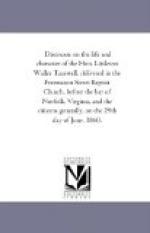On the election of Mr. John Quincy Adams to the Presidency, and especially after the delivery of his first message to Congress, he became hostile to his administration, and opposed its prominent measures. His most remarkable performance was his speech on the exclusive constitutional competency of the executive to originate foreign missions without the advice and consent of the Senate. As a constitutional thesis, without respect to the time of delivery,—for, although Mr. Adams asserted the power, he at the same moment waived its exercise,—as a specimen of his manner of treating a great constitutional question when numerous authorities and precedents are to be examined and set aside, this speech deserves to be studied. With the exception of Gen. Marshall’s speech in the case of Jonathan Robbins, it stands preeminent in our political literature as a model of profound research, of thorough argumentation, and of overwhelming strength. The reader at this day feels that he is borne along by a force which is not only equal to the occasion, but above it, and which it is vain to resist. The speech is no mean system of logic and of the rules of evidence in itself. And in connection with this speech I may mention the speech on the same subject, which he delivered some years later, in reply to Mr. Livingston, and in which the topic is discussed with new illustrations. These two speeches alone survive in any fulness of all his forensic exertions. The speech which Mr. Tazewell himself thought the best he ever delivered in the Senate, was on some one of the bankrupt bills of his term of service; but of this speech not a passage can now be found.




